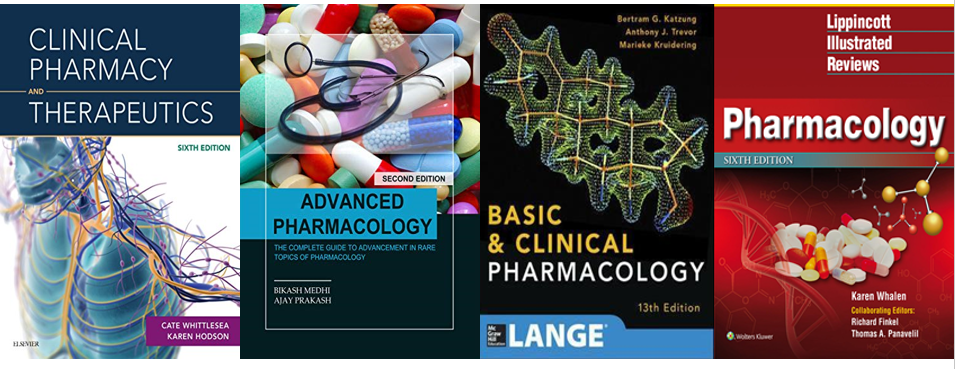Section outline
-
Pharmacology is the study of how a drug affects a biological system and how the body responds to the drug.
The discipline encompasses the sources, chemical properties, biological effects and therapeutic uses of drugs.
These effects can be therapeutic or toxic, depending on many factors.
The student will be able to report the clinical applications, side effects and toxicities of drugs used in medicine. Few inter related areas of pharmacology:
PHARMACOKINETICS
PHARMACODYNAMICS
PHARMACOGENETICS
TOXICOLOGY
-
Name of the Course : Advanced Pharmacology
Course Code : MPH-513
Program : M. Pharm. -
Md. Anamul Haque
Assistant Professor
Department of Pharmacy
Faculty of Allied Health Sciences
Daffodil International University
Dhaka, Bangladesh
Cell Phone: 01767-290194
Email: anamul.ph@diu.edu.bd
ID: 710002372
Personal Information
-

- All the students registered for this course have to enroll in Moodle.
- Students can find all the course materials from Moodle.
- All the students have to submit the soft copy of their "Assignment" in Moodle under assignment section created here and for this they will be graded here.
- One discussion or feedback forum is created under each of the lecture Students have to give their feedback on these forum and marks will be given for their feedback
- Any announcement regarding the class will be posted on Moodle. So they have to keep themselves always active on Moodle.
- All the quizzes and presentation will be held on online (Moodle) and may be few of the class will be held on face to face class and it will be announced before the class.
- The question pattern and the syllabus for the quizzes, midterm and final exam is given here under each of the section (quizzes, midterm and final).
- There are Midterm and Final Examination presentation forum under these sections where students can discuss with each other about their midterm and final exam syllabus, any problem regarding the exam etc.
-
Rationale:
This subject deals with the scientific knowledge and updated information about foundational parts of the pharmacological sciences to opt for major drugs into correct therapeutic categories as a basis for rational disease therapy. It also deals with the study of pharmacokinetics and pharmacodynamics of various drugs.Course Learning Outcomes:
- Discuss different chemical and generic name of drugs, pathophysiology of diseases and treatment
- Apply rational best fit specific disease management
- Justify pharmacotherapy in different condition
- Compare and contrast between different classes of drugs
- Illustrate the functions and mechanism of action in different physiological systems
- Apply the concept and principles of pharmacology to ensure proper use of drugs Calculate medication orders based on the given situation
Course Content:
- Introduction to Advanced pharmacology
- Receptor Pharmacology
Neuropharmacology
- Adverse Drug Reactions
- Cardiovascular Pharmacology
- Cancer Biology and Therapy
- Ophthalmology
- Bioinformatics
- Reactive Intermediates
- Screening of drugs for pharmacological activity
-
Total marks: 100 Total credits: 3
Breakdown of marks
Assessment types
Number of assessments
Marks in each assessment
Total marks
Class test
3 class tests
10 marks
10 marks (Average)
Assignment
5 marks
5 marks
Attendance
Base on class attendance
5 marks
Midterm exam
30 marks (Question types: MCQ,T/F,SQ)
30 marks
Final exam
40 marks (Question types: MCQ,T/F,SQ)
30marks
Viva
Related to subject topics
20 marks
Total marks:
100
-
Learning Outcomes:
- Discuss about different types of receptors.
Signal transduction mechanism and termination of receptor activity, regulation of receptor, their involvement in various biological processes including diseases resulting from receptor malfunction and their role in pharmaco-therapeutics.
- Figure out the role of various neurotransmitters in body.
- Molecular
and cellular mechanisms, pharmacological responses, or pathogenic role by their
activation and clinical importance’s of: Glutamate receptors, GABA receptors,
Catecholamine receptors (α-and β-adrenoceptors, dopamine receptors),
Acetylcholine receptors (nicotinic and muscarinic receptors), 5-Hydroxytryptamine,
Opioid receptors.
Course Content
a) Receptor types
b) Signal transduction mechanism
c) Mapping different receptor in human body
d) Their role in various diseases.-
-
-
Go through the video and fill up the table dragged by clicking the + symbol.
-
Learning Outcomes:
- Discussion about CNS.
- Pathophysiology of CNS.
- Figure out the pathophysiology of Neurodegenerative disorders -Alzheimer’s disease, Parkinson’s disease, Huntington’s disease, Neurodegenerative prion disease.
- Pharmacotherapy for various Neurodegenerative disorders.
Course Content
a) Basic introduction to CNS
b) Pathophysiology of CNS and link with some diseases.
c) Etiology and treatment of Neurodegenerative disorders -Alzheimer’s disease, Parkinson’s disease, Huntington’s disease, Neurodegenerative prion disease. -

Mid term :
Total marks: 25marks
Total time: 30 minutes
Chapter: i) Receptor pharmacology
ii) Neuropharmacology
Assessment Strategy:
MCQ: 20
True /False: 5
Level 1: 15 questions relating to subjects topic and general idea.
Level 2: 4 questions to judge understand ability of particular topics.
Level 3: 4questions relating to elucidation of some pharmacological facts.
Level 4: 2 questions to assess students critical thinking. -
-

SLNO.
Topics
Student ID’s
1
How adrenaline works at beta receptor, Discuss in light of GPCR pathway.
Smarak Islam
2
Illustrate the mode of action of ranitidine depicting related GPCR pathway. What are the adverse effect of chronic PPI therapy?
Salman Farshe
3
Vasodilation mechanism in smooth muscle via parasympathetic innervation. Diseases associated with cholinergic receptor dysfunction.
Md. Mamun Miah
4
Represent the pharmacodynamics of Amlodipine with specific GPCR pathway. Note on alpha1 receptor subtypes with clinical indications.
Sadia Afsana Mim
5
Mechanism of Verapamil with specific GPCR pathway. Differentiate the activity of amlodipine and verapamil.
Suman Majumder
6
Classify adrenergic and cholinergic receptors with all sub-division and locations.
Urmi Datta Gupta,
7
Why levopopa and carbidopa co administered? Justify properly.
Shohana Rahaman Snigdha
8
Show how ipratropium bromide exerts its action in light of GPCR pathway. Mentions its clinical uses.
Rezwana Karim
9
Mechanism of Clonidine with specific GPCR pathway. Note on alpha receptor subtypes.
Fatema Akter Keya
10
Pharmacodynamics of prazosin with specific GPCR pathway. Note on alpha receptor subtypes.
Md. Minhaj Uddin
11
Mode of action of Atenolol with specific GPCR pathway. Note on muscarinic receptor.
Anika Tahsin
12
How salbutamol works to treat asthma, Discuss in light of GPCR pathway. Note on Muscarinic receptor.
Md. Shajib Khan
13
Glycogenolysis in response to fight and flight mode depicting GPCR pathway.
Most. Nazmin Aktar
14
CNS excitatory effect of brain through Ligand gated ion channel.
Ishrat Jahan Bristy
15.
Role of insulin in glucose transport to cell through tyrosine kinase pathway.
Moin Abdullah
-
-
Learning Outcomes:
a) Enrich knowledge about Pathophysiology of heart
b) Understand drugs of heart diseases
c) Got idea about Nitric oxide its Biosynthesis , control, degradation and carriage of nitric oxide, effects of nitric oxide, therapeutic use of nitric oxide.
d) Learn Transduction mechanisms as targets of drug action, voltage sensitive ion channels–structure and function, K+ channels, voltage sensitive Ca+2 channels and the pharmacology of their inhibitors, agonists at b-adrenoceptors, pharmacology of Na+/K+ ATPase and gap junctions
Course Contenta) Pathophysiology of heart
b) Drugs of heart diseases
c) Vasodilators: Nitric oxide - Biosynthesis of nitric oxide and its control, degradation and carriage of nitric oxide, effects of nitric oxide, therapeutic use of nitric oxide and nitric oxide donors, inhibition of nitric oxide, clinical conditions in which nitric oxide may play a part, etc.
d) Ion channels, exchanger and pumps: Transduction mechanisms as targets of drug action, voltage sensitive ion channels–structure and function, K+ channels, voltage sensitive Ca+2 channels and the pharmacology of their inhibitors, agonists at b-adrenoceptors, pharmacology of Na+/K+ ATPase and gap junctions.
-
-
Learning outcome:
- Introduce with ocular physiology.
- Learn about treatment of microbial and viral diseases of the eye.
- Get idea about management of glucoma.
Topic contents:
Overview of ocular physiology.
- Chemotherapy of microbial and viral diseases of the eye.
- Steroid and other anti-inflammatory drugs.
- Drugs used in the treatment of glaucoma, drugs affecting pupil size.
-
Learning outcome:
- Describe different types of adverse drug reactions
- Know about pharmacovigilance
- Get idea about ADR monitoring.
- Understand different type of ADR
Topic contents:
Drug induced diseases-racial, ethnic and gender differences in response to drugs,, p
- Type of adverse drug reactions (ADRs),
- reporting ADRs
- Pharmacovigilance, establishing cause and effect relationship and drug consumption.
- Methodologies for ADRs, Monitoring: spontaneous reporting, intensive hospital-based cohort studies, case control surveillance, prescription event monitoring.
-
Learning outcome:
Got idea about biology of cancer,
Treatment options for cancer
Learn about different pharmacological terms of cancerCourse content:
Introduction to biology of cancer,
Modes of treatment: radio therapy, biological therapy including immunotherapy and gene therapy, chemotherapeutic targets
Abnormal tumor physiology, Growth factors p53 and apoptosisMetastasis, carcinogenesis and genetic predisposition, diagnostic tests and prognostic factor, etc.
-
-
Learning outcome:
- Introduce with basic concept of bioinformatics.
- Learn about bioinformatics techniques for in drug discovery and development.
- Get idea about the role of it in drug development.
Topic contents:
Definition and concepts. importance of bioinformatics, bioinformatics in drug development and assessment; use of bioinformatics techniques for gene identification in drug discovery and development.
- Importance of bioinformatics.
- Bioinformatics in drug development and assessment.
- Use of bioinformatics techniques for gene identification in drug discovery and development.
-

Total marks: 30marks
Total time: 40 minutes
Chapter: i) Cardiovascular pharmacology
ii) Adverse drug reaction
iii) Bioinformatics
iv) Ocular pharmacology
MCQ: 15
True /False: 8
Filling the gaps: 7
Level 1: Sixteen questions relating to subjects topic and general idea.
Level 2: Seven questions to judge understand ability of particular topics.
Level 3: Four questions relating to elucidation of some pharmacological facts.
Level 4: Three questions to assess students critical thinking.





